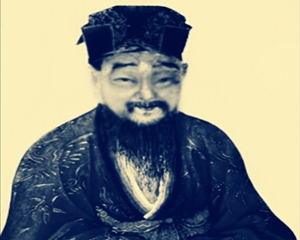晁补之(1053年—1110年11月8日),字无咎,号归来子,济州钜野(今山东巨野)人,北宋时期著名文学家,“苏门四学士”(另有北宋诗人黄庭坚、秦观、张耒)之一。宋神宗熙宁年间,晁补之的父亲晁端友为新城县令,与时任杭州通判的苏轼时有诗歌唱和。晁补之随父同在新城,在苏轼门下亲闻教诲两年之久,《新城游北山记》就是这一期间写的。

晁补之·《新城游北山记》
去新城之北三十里,山渐深,草木泉石渐幽。初犹骑行石齿间。旁皆大松,曲者如盖,直者如幢,立者如人,卧者如虬。松下草间有泉,沮洳伏见,堕石井,锵然而鸣。松间藤数十尺,蜿蜒如大蚖。其上有鸟,黑如鸲鹆,赤冠长喙,俯而啄,磔然有声。
稍西,一峰高绝,有蹊介然,仅可步。系马石觜,相扶携而上,篁筱仰不见日,如四五里,乃闻鸡声。有僧布袍蹑履来迎,与之语,愕而顾,如麋鹿不可接。顶有屋数十间,曲折依崖壁为栏楯,如蜗鼠缭绕乃得出,门牖相值。既坐,山风飒然而至,堂殿铃铎皆鸣。二三子相顾而惊,不知身之在何境也。且暮,皆宿。
于时九月,天高露清,山空月明。仰视星斗,皆光大,如适在人上。窗间竹数十竿相磨戛,声切切不已。竹间梅棕,森然如鬼魅离立突鬓之状。二三子又相顾魄动而不得寐。迟明,皆去。
既还家数日,犹恍惚若有遇,因追忆之。后不复到,然往往想见其事也。
An Account of a Visit to North Mountain at Xin-cheng
Chao Buzhi
Thirty miles north of Xin-cheng, we went ever deeper into the mountains, where the plants, trees, streams, and rocks became increasingly isolated. At first we could still ride among the teeth of the stones. On every side were huge pines, some bent over like the awnings of carriages and others straight like parasols; those that stood upright were like human beings, and those that lay down were like great serpents. Among the grasses beneath the pines were streams bubbling up, then disappearing until they fell into wells of stone with a ringing sound. Among the pines were vines some twenty or so feet long, twisting around like great eels. On the top there were birds, as black as mynah birds, with red crests and long beaks, bobbing their heads up and down and pecking with a rapping sound.
A little farther west a single peak rose abruptly to a prominence, and there was a path marking a division on it, a path that could be traveled only on foot. We tied our horses to outcroppings of stone and went up, helping each other along. When we looked up through the bamboo, we could not see the daylight. We went on like this for four or five leagues until we heard the sounds of barnyard fowl. Monks in cassocks of pain cloth and slippers came out to greet us. As we talked with them, they stared at us in wide-eyed amazement, like deer that could not be touched. At the summit there was a building with twenty or so rooms, its balconied outer hallways curving along the course of the cliff wall, twisting like the course of a snail or a rat, after which we came out into the open again. There doors and windows face one another. As we sat down, a howling gust of mountain wind came, and all the chimes and clappers in the halls were set ringing. We few looked around at one another in surprise, not knowing into what kind of realm we had come. And when it was evening, we all went to bed.
It was then November; the heaven were high and the dew clear, the mountains deserted and the moon bright. We looked up at the stars, which together shed a great light, as if they were right over us. Through the window twenty or so stalks of bamboo began tapping against one another with an endless clacking. Among the bamboo, palm and plum trees stood dark and ominous, looking like disheveled demons holding themselves apart. And we few again looked around at one another, our spirits so shaken that we couldn’t get to sleep. As it gradually grew light outside, we all left.
Several days after I returned home, I was still in a daze as if I had encountered something, so I wrote this account from memory. I never went there again, but I always see what occurred in my mind’s eye.
(Stephen Owen 译)
更多精品翻译素材,敬请关注可可英语。











